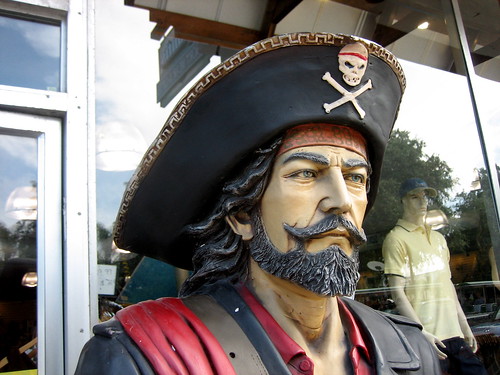Ahoy, me mateys! It’s Talk Like a Pirate Day!
Talk Like a Pirate Day was started in 1995 by John Baur and Mark Summers. Relatively unknown at first, the pseudo-holiday shot into the mainstream in 2002 with an article from humor columnist Dave Barry. Now every year on September 19, buccaneering enthusiasts in the U.S., the UK, Australia, and Netherlands speak swashbuckly.
Just how does one speak like a pirate? Let’s start with the basics. Ahoy is a nautical expression “used to attract the attention of persons at a distance,” and may come from the Middle Dutch hoey, a greeting, and was apparently Alexander Graham Bell’s first choice for the telephone greeting. In addition, a hoy is a “a small vessel, usually sloop-rigged, employed in conveying passengers and goods from port to port on the coast.”
Avast is a nautical command meaning “stop! hold! cease! stay!” and comes from the Middle Dutch hou vast, “hold fast.” A hearty is “a seaman’s familiar form of address”; a matey, “a fellow sailor.” A sea dog is “a sailor who has been long afloat,” while a landlubber is “a person who, from want of experience, is awkward or lubberly on board ship; a raw seaman; any one unused to the sea: a term of reproach or ridicule among sailors.”
Aye is yes. Yar is the same as yarr is the same as arr. Thar is there, land-ho is “Land is over there!” and yo-ho-ho is “a nonce word, now associated with pirates and seafaring.” Shiver me timbers, or for those more formal pirates, shiver my timbers, is “an exclamation of surprise, disbelief or annoyance.” My timbers! is a nautical oath “attested from 1789.”
To have your sea legs means to have “the ability, when walking aboard a ship, to anticipate the motion of the deck so as to walk steadily without losing balance.” To show a leg means “to wake up and get out of bed.” To go on the account means to “turn pirate in the captain’s vessel,” while walking the plank is what it sounds like but also “to be forced to resign from a position in an organization.”
Walk the plank and you may meet up with Davy Jones (not that Davy Jones), “the spirit of the sea; a sea-devil,” while Davy Jones’s locker is “the bottom of the ocean, especially as the grave for sailors.” While locker refers to “a close receptacle, as a chest, a drawer, a compartment, or a cupboard, that may be closed with a lock,” the origin of Davy Jones is more obscure. It may refer to David Jones, an actual pirate in the 1630s. It may be an alteration of duppy, a West Indian term for a ghost or spirit, or refer to Jonah, “in the Bible, a prophet who was swallowed by a great fish and disgorged unharmed three days later,” and also “a person on shipboard regarded as the cause of ill luck.”
Swag is “plundered property” and comes from the Old Norse sveggja, “to swing, sway.” Nowadays the word also refers to “handouts, freebies, or giveaways, such as those handed out at conventions,” or “appearance, style.” Another way to say stolen-pirate-stuff is booty, or “spoil taken from an enemy in war; that which is seized by violence and robbery.” It comes from the Dutch buiten, “to exchange or plunder.” The Dutch vrijbuiter gives us freebooter, “a robber; a pillager; a plunderer,” and filibuster, “a freebooter: in history, a name distinctively applied to the West Indian bucaneers or pirates of the seventeenth century,” and also “a delaying tactic, especially the use of long, often irrelevant speeches given in order to delay progress or the making of a decision, especially on the floor of the US Senate.” (So a politician who employs a filibuster is actually talking like a pirate!)
Feeling thirsty? Head over to a shanty where from the hogshead, you can get yourself a nipperkin or noggin of rum, rumfustian, bumbo, or grog, “a mixture of spirit and water served out to sailors.” Grog is supposedly “an allusion to Old Grog,” the nickname of Edward Vernon, an 18th century British admiral who wore a grogram cloak and “who in August 1740 ordered his sailors’ rum to be diluted.” Grog gives us groggy, “slowed or weakened, as by drink, sleepiness, etc.”, and could give you grog blossoms if you partake too much and too often.
While at sea, you may be limited to hardtack, a “large, coarse, hard biscuit baked without salt and kiln-dried”; salt horse (actually beef) also known as salt junk; lobscouse, a stew of hardtack and salt horse; and burgoo, “boiled oatmeal seasoned with salt, butter, and sugar.” As a result, unfortunately, you’ll probably get scurvy, “a disease caused by insufficient intake of vitamin C,” perhaps an alteration of scurfy, which comes from the Old Norse skyrbjugr, “a swelling (bjugr) from drinking sour milk (skyr) on long sea voyages.”
For posts on the pirate accent, turn to the Dialect Blog and Language Log. Google the pirate way, and learn even more pirate vocab from this list, this one, and this one. Check out this tango of pirates (a tango is a group of pirates), and this assortment of ruffians, villains and scamps; explore these seaworthy words, these nautical tags, and these nautical words and phrases that have taken on metaphorical meanings; or dig up some buried treasure from this secret stash.
Still not enough? Follow us on Twitter for a week’s worth of pirate-themed words and lists of the day.
Fair winds and God speed to all ye sea dogs and landlubbers alike!
[Photo: CC BY 2.0 by Kate Haskell]
